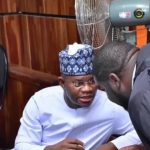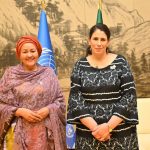Nigeria at a Crossroads: Why APC Risks Losing Its Stronghold – Bala
By Bala Salihu Dawakin Kudu | Democracy Newsline Newspapers
July 5, 2025
Northern Nigeria, once the unshakable political fortress of the All Progressives Congress (APC), now stands at a precarious crossroads. Although the region delivered over 80% of the votes that ushered President Bola Ahmed Tinubu into office in 2023, widespread disillusionment threatens to erode the APC’s dominance. The causes are unmistakable: unchecked insecurity, an absence of transformative development projects, and a growing sense of political neglect. Without urgent intervention, the 2027 elections could mark a historic realignment in the North’s political loyalties.
Since taking office, President Tinubu’s administration has reportedly disbursed over ₦17 trillion. Yet, not a single project exceeding ₦1 trillion has been initiated in Northern Nigeria. This glaring omission contrasts starkly with mega-projects in the South—such as the ₦15.6 trillion Lagos-Calabar Coastal Highway—dominating headlines and investment.
According to the Nigerian Analyst, the North’s infrastructural growth lags behind the national average by nearly 30%. This fiscal disparity fuels a narrative of marginalization, fostering a sense that the region’s votes were bartered for “empty promises and invisible contracts,” as noted by political analyst.
Security remains the greatest threat to the region’s stability. Banditry, farmer-herder clashes, kidnappings, and terrorism have devastated communities. Under former President Buhari, these challenges worsened, and many expected Tinubu to bring relief. Farmers in Zamfara, Sokoto, Kebbi, and Katsina pay ransoms to access their farms—or abandon them altogether. Militia groups like Lakurawa, operating in Kebbi and Sokoto, have swelled their ranks, recruiting vulnerable youth, including drug addicts, to terrorize civilians.
Despite the presence of Northern natives in key security roles—such as State Minister of Defence, Senator Abdullahi Mutawalle—violence persists. Mothers like Amina from Sokoto live in fear for their children’s safety, while traders in Kano face daily threats of robbery. The administration’s efforts to combat insecurity are obscured by misinformation and an opaque communication strategy. This vacuum has emboldened opposition parties, which now campaign vigorously on promises of security and regional respect.
A recent survey by the Kaduna-based Centre for Democracy and Development revealed that 67% of Northerners feel the government has failed to protect them. This perception risks turning a once-solid APC electorate into a battleground for opposition gains.
Security forces face shortages in equipment, funding, and psychological support. Attacks on soldiers in Borno and increasing urban crimes in Kano highlight these systemic weaknesses. The government must urgently bolster resources and forge stronger community partnerships to stem insecurity.
To salvage its political future in the North, the APC-led government must:
Develop tailored, well-funded security plans for each state, improve intelligence capabilities, and enhance welfare for security personnel, Commit to projects valued over ₦1 trillion focused on dams, roads, agro-industrial parks, and energy infrastructure in Northern state, Conduct listening tours in restive areas to build trust and combat misinformation with transparent communication, and Leverage Northerners in government roles as active agents of change, not symbolic appointments.
The people’s patience has worn thin. Without decisive action, the APC risks losing the North, a region that once appeared politically unassailable. As Dr. Ibrahim warns, “The 2027 elections could be the moment the North says enough is enough.”
The question remains: Will the Tinubu administration rise to the challenge and restore hope to Northern Nigerians, or will history record 2027 as the beginning of APC’s decline in the region.
Bala Salihu Dawakin Kudu
Democracy Newsline Newspaper
Contact: 08060017934












